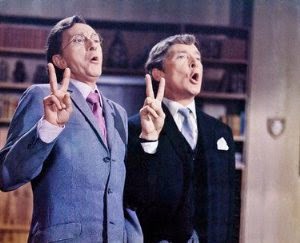This was perhaps a more serious blog than usual, however I think discussing camp comedy and the role of gay people in the Carry On series is really interesting. As with many aspects of the films, they often highlight what was happening in Britain at the time. They provide a fascinating time capsule...
I've always thought the Carry Ons were camp. Pantomimes on the big screen full of big characters and comforting, familiar innuendos. Although many of the actors who appeared are gay icons, from Kenneth Williams and Charles Hawtrey to Joan Sims, Barbara Windsor and Hattie Jacques, gay men and women were barely, if at all, referenced or represented in the films themselves.
The Carry Ons were made over a mammoth twenty year period which saw Britain change almost unrecognisably from a cosy but tough post-war nation to a country entering a new, more enlightened age. When Carry On Sergeant was released in 1958 homosexuality was still illegal in Britain. Hard to imagine now, given that gay marriage was made legal last year. It wasn't until 1967 that things began to change.
Both Williams and Hawtrey were the main proponents of camp in the Carry Ons, although they were joined in two films by legendary comedian Frankie Howerd. Again, Frankie was gay but neither of his Carry On roles exhibited any signs of this. In Doctor he had rude underpants, decorated with scantily clad ladies, removed by Matron Hattie Jacques. He was married to Joan Sims by the end of the film. In Up the Jungle two years later, Frankie once again flirted with Joan although his mannerisms and performance suggested otherwise!
John Clive played it extremely camp and effete while Kernan is much more manly, flirting with Sally Geeson's Lily immediately on meeting. Clive is then seen growing frustrated and playing away from the group in traditional Hawtrey style and of course, by the end of the film Nicholas gets together with Lily, leaving Robin alone and tipsy. Watching Carry On Abroad as a child, all this passed me by, but now as an adult it's quite awful! It is sending out a clear message as to what's right and normal, and what's not.
Apart from that, we have the gloriously awful Cecil Gaybody, brought painfully to life by Scottish comedian Jimmy Logan, in Carry On Girls. Logan was apparently mortified with this role which was clearly meant for Charles Hawtrey, who had by now left the film series. Gaybody ticks off every camp cliche in the book and it's a struggle to find anything complimentary to say about that character. I also remember a brief moment in Carry On Emmannuelle (which I've only watched all the way through once) in which an openly gay man walks past a guardsman on duty and tips him the wink. This moment comes after Suzanne Danielle's title character has exhausted herself trying to pull the guardsman. A pointless moment in a dreadful film.
The Carry On films are inseparable from camp comedy and gay culture. However while we still love them today, they very much illustrate the time in which they were written, made and released. Looking back on them now, they are all pretty harmless compared to some of the material we see today.
Having said that, there are elements of some of these films which do leave a bitter taste in my mouth, none more so that the depiction of gay characters during a period in our history when the landscape was definitely changing.
Clicking on the adverts helps to keep this blog going.




.jpg)
No comments:
Post a Comment